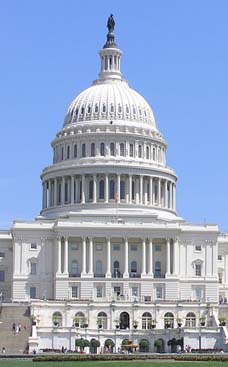2006.12.20: December 20, 2006: Headlines: Figures: COS - Cameroon: Journalism: Speaking Out: Budget: The Capital Times: Margaret Krome writes: Congress shouldn't toss earmarked items blindly
Peace Corps Online:
Directory:
Cameroon:
Special Reports: Cameroon RPCV and Columnist Margaret Krome:
2006.12.20: December 20, 2006: Headlines: Figures: COS - Cameroon: Journalism: Speaking Out: Budget: The Capital Times: Margaret Krome writes: Congress shouldn't toss earmarked items blindly
Margaret Krome writes: Congress shouldn't toss earmarked items blindly

"People love to hate earmarks, assuming that they either line the pockets of special interests or are teapot museums, bridges to nowhere or other totally gratuitous projects. But much of the nation's most important work is earmark-funded, ranging from the most visionary and innovative work in alternative energy and sustainable agriculture to AIDS research and prevention, health care and crime prevention. To cut earmarks wholesale wastes enormous amounts of taxpayers dollars by forcing sudden layoffs or closing facilities that must reopen at greater cost later. Rather than sever all work without regard to merit, appropriators should establish sound criteria for funding them or else defer this surgery until they can better distinguish fat from bone and essential organs. " Journalist Margaret Krome served as a Peace Corps Volunteer in Cameroon.
Margaret Krome writes: Congress shouldn't toss earmarked items blindly
Margaret Krome: Congress shouldn't toss earmarked items blindly
By Margaret Krome, Dec. 20, 2006
Congressional Democrats announced last week that they're taking a lesson from Republicans who have dodged congressional funding responsibilities.
As they are quick to protest, they didn't create the situation they're required to fix, and they haven't been given time to fix it properly. However, important programs stand to lose if they don't modify their plan.
Wisconsin Rep. Dave Obey, incoming House Appropriations Committee chairman, joined with his Senate counterpart, Robert Byrd of West Virginia, to announce a plan for the Fiscal Year 2007 appropriations process, which Republican leaders did not complete before ending the 109th Congress.
Obey and Byrd plan to make permanent the FY07 "continuing resolution," which is how Congress routinely keeps the federal government functioning when Congress hasn't completed appropriations bills; it simply takes the status quo (Fiscal Year 2006) appropriations levels and operates based on those levels.
Usually such measures are temporary fixes until Congress passes appropriations bills. But former Senate Majority Leader Bill Frist, R-Tenn., refused to bring all but defense and homeland security appropriations to the floor before elections, fearing the bad karma resulting from an honest look at President Bush's deficits.
To avoid dealing with that bad news, Congress plugged the federal government into a continuing resolution since Fiscal Year 2007 began on Oct. 1. Obey and Byrd plan to make that permanent at least until the Fiscal Year 2008 begins next October.
It's reasonable to criticize Republicans for having created the nation's budget problems. Their tax cuts and spiraling defense and homeland security spending have intentionally starved the budget into a skeleton of what it was six years ago as a tactic to force down government spending on domestic programs. And certainly, Republican leaders' cynical refusal to finalize the nine unfinished spending bills in the lame duck session was intended to stick it to Democrats and watch them squirm over the budget mess.
So it's understandable that Obey and Byrd would refuse to accept the terms of the mess handed to them. But now it is Democrats' responsibility to create the best federal government possible. The Obey-Byrd plan as currently described risks disrupting crucial federal functions.
One big problem is that the plan calls for a moratorium on earmarks, the special projects requested by individual lawmakers for spending in their state or district.
People love to hate earmarks, assuming that they either line the pockets of special interests or are teapot museums, bridges to nowhere or other totally gratuitous projects. But much of the nation's most important work is earmark-funded, ranging from the most visionary and innovative work in alternative energy and sustainable agriculture to AIDS research and prevention, health care and crime prevention.
To cut earmarks wholesale wastes enormous amounts of taxpayers dollars by forcing sudden layoffs or closing facilities that must reopen at greater cost later. Rather than sever all work without regard to merit, appropriators should establish sound criteria for funding them or else defer this surgery until they can better distinguish fat from bone and essential organs.
Also, the Obey-Byrd plan forces the federal government to operate for another year under the legacy of poor legislating reflected in the 2006 budget. The federal judiciary is already itemizing cuts it would have to make to probation officers and other essential staff. Agricultural conservation programs cut in 2006 but re-funded in 2007 will be unable to recover. New energy initiatives will suffer. And so on.
Both Obey and Byrd have been responsible funding leaders, and they promise to make what they call "modest adjustments" to 2006 funding levels to ensure the sound functioning of the federal government.
Despite the press of time, thoughtful adjustments are essential. Without them, the plan risks causing irreparable damage to the fabric of the federal government.
It would be a regrettable first act if Democrats responded to an irresponsible problem left them by Republicans with an equally irresponsible solution.
Margaret Krome is a Madison resident who writes this column biweekly. E-mail: mkrome@inxpress.net
Published: December 19, 2006
Links to Related Topics (Tags):
Headlines: December, 2006; RPCV Margaret Krome (Cameroon); Figures; Peace Corps Cameroon; Directory of Cameroon RPCVs; Messages and Announcements for Cameroon RPCVs; Journalism; Speaking Out; Budget; Wisconsin
When this story was posted in December 2006, this was on the front page of PCOL:





Peace Corps Online The Independent News Forum serving Returned Peace Corps Volunteers
 | All Volunteers Safe in Fiji
All Volunteers in Fiji are safe and accounted for. The Peace Corps is monitoring the situation very closely. Volunteers are on standfast but there are no plans for evacuation at this time. Peace Corps is working closely with the US embassy and with host country partners to monitor the situation. Peace Corps is confident that volunteers are not in harm's way. The military seized control of Fiji on December 5 after weeks of threats. Subscribe to our news feed to read the latest breaking news. |
 | Ron Tschetter in Morocco and Jordan
On his first official trip since being confirmed as Peace Corps Director, Ron Tschetter (shown at left with PCV Tia Tucker) is on a ten day trip to Morocco and Jordan. Traveling with his wife (Both are RPCVs.), Tschetter met with volunteers in Morocco working in environment, youth development, health, and small business development. He began his trip to Jordan by meeting with His Majesty King Abdullah II and Her Majesty Queen Rania Al Abdullah and discussed expanding the program there in the near future. |
 | Chris Dodd's Vision for the Peace Corps
Senator Chris Dodd (RPCV Dominican Republic) spoke at the ceremony for this year's Shriver Award and elaborated on issues he raised at Ron Tschetter's hearings. Dodd plans to introduce legislation that may include: setting aside a portion of Peace Corps' budget as seed money for demonstration projects and third goal activities (after adjusting the annual budget upward to accommodate the added expense), more volunteer input into Peace Corps operations, removing medical, healthcare and tax impediments that discourage older volunteers, providing more transparency in the medical screening and appeals process, a more comprehensive health safety net for recently-returned volunteers, and authorizing volunteers to accept, under certain circumstances, private donations to support their development projects. He plans to circulate draft legislation for review to members of the Peace Corps community and welcomes RPCV comments. |
 | He served with honor
One year ago, Staff Sgt. Robert J. Paul (RPCV Kenya) carried on an ongoing dialog on this website on the military and the peace corps and his role as a member of a Civil Affairs Team in Iraq and Afghanistan. We have just received a report that Sargeant Paul has been killed by a car bomb in Kabul. Words cannot express our feeling of loss for this tremendous injury to the entire RPCV community. Most of us didn't know him personally but we knew him from his words. Our thoughts go out to his family and friends. He was one of ours and he served with honor. |
 | Peace Corps' Screening and Medical Clearance
The purpose of Peace Corps' screening and medical clearance process is to ensure safe accommodation for applicants and minimize undue risk exposure for volunteers to allow PCVS to complete their service without compromising their entry health status. To further these goals, PCOL has obtained a copy of the Peace Corps Screening Guidelines Manual through the Freedom of Information Act (FOIA) and has posted it in the "Peace Corps Library." Applicants and Medical Professionals (especially those who have already served as volunteers) are urged to review the guidelines and leave their comments and suggestions. Then read the story of one RPCV's journey through medical screening and his suggestions for changes to the process. |
 | The Peace Corps is "fashionable" again
The LA Times says that "the Peace Corps is booming again and "It's hard to know exactly what's behind the resurgence." PCOL Comment: Since the founding of the Peace Corps 45 years ago, Americans have answered Kennedy's call: "Ask not what your country can do for you--ask what you can do for your country. My fellow citizens of the world: ask not what America will do for you, but what together we can do for the freedom of man." Over 182,000 have served. Another 200,000 have applied and been unable to serve because of lack of Congressional funding. The Peace Corps has never gone out of fashion. It's Congress that hasn't been keeping pace. |
 | PCOL readership increases 100%
Monthly readership on "Peace Corps Online" has increased in the past twelve months to 350,000 visitors - over eleven thousand every day - a 100% increase since this time last year. Thanks again, RPCVs and Friends of the Peace Corps, for making PCOL your source of information for the Peace Corps community. And thanks for supporting the Peace Corps Library and History of the Peace Corps. Stay tuned, the best is yet to come. |
 | History of the Peace Corps
PCOL is proud to announce that Phase One of the "History of the Peace Corps" is now available online. This installment includes over 5,000 pages of primary source documents from the archives of the Peace Corps including every issue of "Peace Corps News," "Peace Corps Times," "Peace Corps Volunteer," "Action Update," and every annual report of the Peace Corps to Congress since 1961. "Ask Not" is an ongoing project. Read how you can help. |
Read the stories and leave your comments.

Some postings on Peace Corps Online are provided to the individual members of this group without permission of the copyright owner for the non-profit purposes of criticism, comment, education, scholarship, and research under the "Fair Use" provisions of U.S. Government copyright laws and they may not be distributed further without permission of the copyright owner. Peace Corps Online does not vouch for the accuracy of the content of the postings, which is the sole responsibility of the copyright holder.
Story Source: The Capital Times
This story has been posted in the following forums: : Headlines; Figures; COS - Cameroon; Journalism; Speaking Out; Budget
PCOL35652
13



















